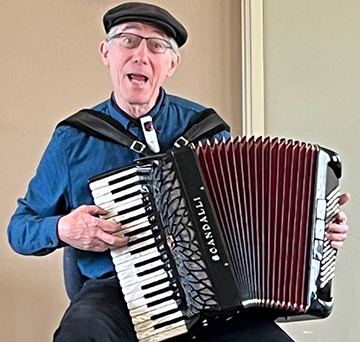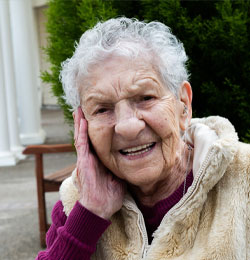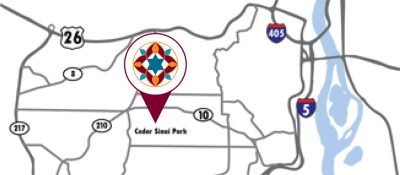April 27, 2023

April 20, 2023

5/2/2023 MEMORANDUM
DATE: May 2, 2023
TO: Cedar Sinai Park Colleagues, Residents, Families, and Friends
FROM: Kimberly Fuson, Chief Executive Officer
RE: New Covid-19 Positives at Robison Jewish Health Center/Harold Schnitzer Center for Living (RJHC/HSCL)
Dear Colleagues, Residents, Families, and Friends,
Since our last communication, we learned that five residents at Robison Jewish Health Center/Harold Schnitzer Center for Living tested positive for Covid-19. Our residents are fully vaccinated and aymptomatic.
- Holzman closed to visitation through at least Wednesday, May 17 (except compassionate care).
- Holzman closed to all group activities.
- No communal dining in Holzman; room service is available for those wanting to take extra precautions in all households.
- Residents: Masks strongly recommended in ALL indoor common areas.
- Staff mildly symptomatic: 1
- Staff vaccinated: 1
- Residents aymptomatic: 5
- Residents fully vaccinated: 5
Volunteer Brings Joy to Residents Through Music

Watching our slender volunteer Alan Moses lug his 21-pound accordion through the halls of Cedar Sinai Park to then set it on his knee for a playing and singing session with the residents is truly a lesson in dedication.
“It still feels like I’m wrestling an octopus every time I strap this thing on,” said the self-deprecating Alan, with a chuckle, as he nibbled an apple between gigs at our Home. “I found some great videos on accordion ergonomics,
Sonia Liberman

She’s No Delicate Flower
Somehow, Kashemish always stayed three steps ahead of the Gestapo.Kashemish kept his word and somehow, “always stayed three steps ahead of the Gestapo,” Sonia reports. At his own peril, Kashemish shifted her from farm to farm and family to family throughout the War, a young, grammar-school-aged Jewish girl undercover, pretending to be a Christian. Sonia slept in the woods of the Black Forest, learned to gather milk and eggs from cows and chickens, moved quietly and quickly in the night, and was shuttled from convents to orphanages to worse—families dependent on her for grueling child labor but withholding all but an occasional crusty bread. Somehow, she survived. Yet once liberated following the war, her story did not become appreciably easier. As an orphan, she was transported through Czechoslovakia, Switzerland, Italy, and Germany, each in turn rejecting her and children like her, until she finally landed at an orphanage in France. Sonia ultimately made her way from there to Israel, finding distant relatives of her parents. As a young adult in then-Palestine, she met her future husband, soon married, went on to have three children, and eventually made her way to the United States with a growing family.
“I felt I have to survive.It would make sense if someone with Sonia’s history became embittered, distrusting, pessimistic. Instead, Sonia determined she had to bring good into the world. “I felt I have to survive,” she says. “I wanted to start my own family to replace the family I lost. I didn’t know how, I didn’t know if it would happen, but that was my plan.” Sonia had never learned to read and write as her would-be school years were all spent in hiding. But she learned. She received her bachelor of arts degree at University of Judaism the same year her son Gershon received his (aka Gary, Technical Services Director for Oregon State Hospital). “My father told me I would be a good teacher,” she says simply, “so that’s what I did.” She went on to acquire a master’s in Judaic Studies and became a one-woman Jewish teaching institution. She instructed day school and Hebrew School students for 50 years across Los Angeles. She moved to Portland in 2017 to be closer to Gary and his wife Esther (a bead artist and member of ORA Northwest Jewish Artists), and into Rose Schnitzer Manor. Instead of becoming cynical and disillusioned with humanity, Sonia’s dark youth intersected with a scrappy, discerning personality, tenaciously turning her into someone always seeking to be a mensch—a good human. “I am not the best person in the world,” she admits, “but I try to be good to people. G-d gave us good and bad,” she adds. “When I see someone who is homeless, for instance, I don’t judge. We are not better, smarter, than they are. We shouldn’t judge. We need to ask, ‘What happened to them to make them this way?’ There is always a reason,” she insists, having long been traumatized and homeless herself. Ever the master educator, Sonia now visits students at local high schools, sharing the history and truth of the Holocaust. She offers messages we would all do well to heed: “If you strongly believe in justice, fight for it. Stand up. Not with your fist—if you are able to do so, talk and reach resolution. Talk. You have to try. But,” she raises a finger as a caveat, insistent, “in Judaism you only have to ask forgiveness three times. If the third time someone is not willing to forgive you, that’s their problem, not yours!” She lives her words and has been known to “get in trouble” for ceaselessly defending others. She will take someone aside and tell them, “’That was not right, you embarrassed that person in front of other people. You should apologize. I will nag you until you apologize!’ And you know what? They do. They apologize!” “’Ima, do you have to fight so much for justice all the time?’” she says her son Gary asks her, “’Can’t you leave it alone, even sometimes?’” “I can’t,” Sonia confesses, shaking her head. “I am a human and I have rights too. if I am here in this world, I should at least speak up for those who can’t speak for themselves.”
April 5, 2023



